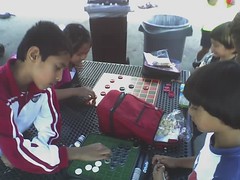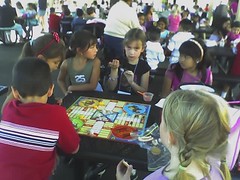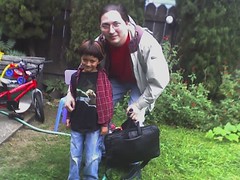Well, I’m posting my notes from the very interesting meeting. It’s long, but I think it’s important. My own thoughts are in square brackets, [like this].
The meeting was run by ELAC, the English Learners Action Committee, in Spanish with English translation by one of the teachers, Catherine. There were over 40 people at the meeting, mostly parents, with a couple of teachers, the principal, and I think a school board member or staff person. It was the best meeting I’ve been to in quite a while! Not quite as good as the town meeting held by Barbara P. (who is now the mayor) and the RCEF when all the funding got cut, but a very good meeting that stuck to the agenda. Yet people really spoke their minds.
All the way through, Rosario is speaking in Spanish and then Catherine translates. Other speakers, I have tried to indicate original language with (eng) or (sp).
Rosario opened the meeting by inviting Jan, the Superintendent, to speak.
Jan thanked everyone and ELAC. She would like to work on a strategic plan. It will be a roadmap for the next 5 years, and will be the product of participation from students, staff, parents, and community members. There is info on the web about how to get involved and join a committee, or you can call or email her office. The budget process will be changed to allow for more community involvement and community forums.
Wed. night there is a board meeting. [This conflicts with our school PTA meeting unfortunately.]
Rosario: At this meeting we’ll follow the agenda here on the handout which are the the concerns of the spanish speakers, Latinas, of our committee. One of those concerns is to have one calendar for the district.
[There was a funny moment during translation as Catherine hung on the word “inquietud”, presumably trying not to say “worries”, “unease”, “anxiety”, or “unquiet” until about 12 people including me yelled “concerns!” in proper neutral-speak.]
Jan: Do you want me to respond?
Rosario: Yes.
Jan: This is a good topic for discussion. We have year round, traditional, and the Sequoia district calendars. There are families with children in all three systems! We would like to get input, and also to look at data about one system being better than the other, as far as attendance. Our district loses funds when students don’t come to school.
[A general remark that Jan is hitting many of my own personal desires in that she keeps emphasizing “conversation”, “process”, “discussion”, and “community involvement”. ]
Parent: (english) The issue isn’t new. How long will it take to decide? And then how long to implement?
Jan: We will discuss it this fall. California requires we negotiate that with teachers. We want parent input too. Our goal is to make a 3 year long term commitment, that whatever we end up doing, it will be consistent for 3 years.
Parent: [in spanish] It really should have parent participlation. Parents should be a big part of the decision.
Jan: You are absolutely right. Yes!
Rosario: Clases mixtas. We have mixed age classrooms, K-2, and 3-4-5, and we have traditional grades too. It’s good to have both options. We depend on that.
Jan: I know there are good reasons in favor of having both, and…
Mike: (the principal) [interrupting] The staff is not in agreement and will decide…
Liz (me) : (interrupting) Do you mean that the staff will decide without involving parents…
[About 10 people immediately interrupt my interruption-interruption and Jan resumes the helm. For which I am very grateful.]
Jan: I think we need to know the process this will be decided by. The parents will be involved in that process. We need to make that process very clear.
Parent (eng) : I want to hear from teachers – what is the reason for going all multi-age?
Parent (sp): Why change when we have both options now?
Mike: The Superintendents sets how many teachers per number of kids. Our system creates a unique system. Understand where our school is at. The site council asked us to put a plan together. We have parent info night, we have parent day every Thursdays for observation in the classroom to see how things are working. The enrollment changes are confusing. I end up having to ask the Superintendent for another teacher. We need a plan.
[We have a parent day every Thursday? What? I am also not sure what was just said. I think that he was saying, at the beginning of the year, it is hard to fit the children into the classrooms and teachers we have allocated because our system is complex.]
Jan: The magnet school money used to pay for an extra teacher. Becaue of the 3-4-5 mixed classes and the law about class size. 4-5 mixed can be bigger.
[Oh. I think I get it. Once you mix in 3rd grade the law sets limits on class size? Maybe the limits for K-2 are also different.]
Karen, Bobbi’s mom: The process is complicated… Multi-age, traditional, or combination? The site council and PTA will help the school. Discussion will happen. I want to reassure the parents here that there will not be just one discussion. There will be several. You won’t be able to miss it.
[I am reassured! Karen rocks.]
Parent (sp): What if your child is not doing well in the multi-age class? Then what? And you think they would do better in the regular class? And they don’t get promoted to the next grade? I don’t want to come to several discussions. I want to just give my opinion and have it counted.
Jan: Yes, I agree. Be involved. Testify to the school board. The school needs to help every child learn and if there is a problem, the school has to make a plan to help them.
Parent: How do we find out what is going to be on the school board agenda?
Mike: Here in the office, I have it (on my desk? On my door?)
Jan: It is also on the web site.
Parent (eng): Thanks to ELAC for having this great meeting. I am surprised at what people are saying and didn’t know anyone had these concerns. I think that for everyone that complains, there are 20 people who are not saying anything because they are perfectly happy and don’t have a problem. I picked this school over private school because of the multiage system.
L.B. I want to answer the qustion asked earlier. Why multi-age? Why do the teachers want it? Because it is good for parent involvement, and it helps us with balance in rooms.
Parent: What balance?
LB: Balance of, for example, English language learners, PTA parents, single-family households, in each room. It helps us refocus the school. We lost our performing arts magnet focus. Multi-age helps us bring the staff together. What do we value here at JG? This gives us a greater sense of community. The straight grade classrooms often don’t get included in activities. This way we will be more joined in focus and sense of community.
Parent (eng) : I am here at JG because of multi-age. Our family is mixed language, my husband is German. We could have gone to Roy Cl**d or private but we chose to come here because of multi-age and also diversity.
Rosario: *moves the agenda onward*
Parent (sp): What about the reading specialist? We want to know, will we still have one?
Jan: We are hiring. We’re looking. The job is open right now.
Parent: will we have the same one as last year?
[someone answers: Ms. Bobby is retiring for real this time, after 12 years. She will cover for a month or so. We’ll have a new person.]
Rosario: How much time will the job be for? Secure job? Funded by Title I? Or by what? Will we have one every year and are there funds committed to that? Or do we need to do fundraising?
Mike: This year the funding comes from Targeted instructional (something). Our priority historically with the budget has been, People first, then things.
Karen: The site council meetings.
Parent (eng) : When are the site council meetings? How do we get information on that? Are the meetings open?
Karen: They are the first Wednesday of every month, in this room.
Mike: The meeting times are up on the door to the front office.
Liz (me): Can meetings like this get sent home regularly, in the packets or newsletter, in a timely way, to all parents? Not just on the website and the door? Not, the day before or the day of the meeting?
[murmur of agreement]
Rosario moves the topic to the computer lab. In past years we used to have a teacher, Mark W. Now what? Will we have computer classes?
Jan: Yes. Not a teacher, but technicians. The district is in transition moving towards hiring technicians instead of teachers for those positions.
[murmur around room]
Mr. F, a teacher: Mark used to do huge amount of stuff. Amazing things. Multimedia help for our performances. Everything. Classes. His hours kept getting cut and he could do less. Now he’s not here anymore.
Jan: All the schools will be facing this. The PTA, or afterschool classes perhaps.
Parents: In our society computers are important. Our kids need to learn computers. You’re saying we won’t teachers in the computer lab?
Jan: Actually in the early grades this may not be true. Art, music, other activities are proven to be good for young kids. Our classroom teachers can teach basic skills of keyboarding, etc.
Rosario: Test scores. The east side schools all failed. It was in the paper. Are we next?
Jan: I think all the other schools across the country as well as in our district are in the same boat. We need to keep the computers fixed and the programs running.
Parent (eng) Can’t we have technicians fix them from a central district office and still have teachers at the schools?
Jan: We just don’t have the funds for that.
Rosario: *moves the agenda* Emergencies. Who is in charge when the principal is not here?
Mike: It’s not a problem. The office staff always know where I am. If I am not reachable then Ms. Marilyn, or… (someone else) or LB.
Parent (eng): Recess, arrival, dismissal, children can just leave. Not enough supervision. We need recess monitors.
Jan: Of course every school needs to discuss this and settle it for the school among the parents and staff.
Parent (esp): Stranger safety?
Mike: Yes, Stranger danger. I went to every classroom and talked about it on the very first day.
Parent (sp): What we want to know is, who is in charge if you are not here? Because that is not clear.
[I was out of the room , but someone brought up the fact that many handouts and bulletins from the school to parents were not translated into Spanish, this past month.]
Parent (eng): what is the balance of languages in the school ?
Mike: 60-70% English learners, most latino, 40-45% English only.
[oh, math, it’s important!]
Parent or staff (eng): I think it’s 50/50 right now. Then, 17% are… (I missed what she said.)
Parent (sp): Older children translate for their parents. The younger children can’t.
Rosario: Next agenda item. Sra. Gloria Munguia. We have a petition. We want her back. We rely on her, we trust her, she knows us, she knows our children. She makes sure they eat vegetables, fruit, etc. and eat healthy and get enough food. We rely on her, and on Jose, the custodian, they know our kids and keep an eye on them. Been here for years.
Jan: Here, I am sad that I can’t help… this is the issue I have to tell you is out of my hands. The food service company we contract with transferred her.
Parent (esp): The new cafeteria person yells, is rude, kids come home hungry. We are very concerned.
Jan: That is a personnel issue and it is against the law for me to discuss it in a public forum. But, you should take your complaints to the principal right away if things like that happen.
Mike: the one entree problem. They can eat as many fruits or vegetables as they like. No one should go hungry.
Parent (eng): snacks issue
Mike: We have a list of okay snacks. It is the teachers’ decision whether to allow them. But if a child is hungry and it is interfering with their ability in class they can come to me, or the front office, we will get them food. Some teachers have snacks from the list. No candy, because parents were complaining about candy being handed out all the time.
[That’s funny. When I asked him directly a few weeks ago about the snacks, he told me that it was against the District policy to have crackers or anything in the classroom anymore unless children brought it individually from home, and that it was the No Child Left Behind Act, etc. I never heard that now it has changed and we can send boxes of crackers again.]
Mike: Birthdays are okay. We’re not going to stop you from having things for your child’s class on their birthday.
Parent (sp): The quantity of food is okay. It’s that the cafeteria employee is rude. I’m in there and I hear it.
Jan: Bring your concerns tonight, after the meeting, to Mike.
Rosario: That is the last opinion on the cafeteria issue. Now, to the opinions or suggestions. A suggestion box. A form for complaint, also. At the school district meeting, they have a form. We want that too.
Jan: Sounds great.
Mike: A suggestion box would be a great idea.
Maria: Yes, but, what we are trying to say is, what is the process for a complaint form, when a problem is not addressed, when someone feels a problem is not addressed at the school level, how do we file a complaint with the district.
[murmurs …]
Mike: Of course, I hope that we can work out any problems or concerns, but you can get copies of that form in my office.
Parent (eng): Yes, but, the complaint form should not be in the principal’s office! It’s like, hi, I’m here to file a complaint against you, can I have the form? I don’t want to have to ask for the change of school form either…
[laughter from parents]
Parent (eng): It needs to be anonymous sometimes.
Jan: I like to think that complaints can lead to solutions. We want to hear them.
[right on!]
Rosario, in closing: We all want to work with the district. We would like to know more about the funds for our school. We need help understanding the budget.
Jan: I would be happy to come back to your meetings any time. Our new budget person is fantastic. He can come and give an explanation.
Various parents: Thanks so much for ELAC meeting. Good meeting. A lot said. Good to get it out there. Thanks to Rosario and to Mike and to Jan, and to Catherine for translation. Rosario should run for PTA president.
****
This was all fascinating and I have my own opinions of it all, which would burn a hole through your head and are probably unprintable. It was interesting to sit through the meeting next to my neighbor, who doesn’t speak Spanish at all and whose English is okay but maybe not up to following it all. I’ll ask her later… I am so curious to hear what she thought of it all.
I noted while counting heads that there were 4 dads and 30+ moms or grandmas. The child care room downstairs was very full of children. The meeting lasted 2 hours.
Afterwards, I spouted off a little to Lou’s mom, Jen, who I suddenly realized who she was when she said what her email is. We have been on the Moms Club mailing list together for the last 5 years, I think! Her son and Moomin discussed Captain Underpants, and both confessed to running around the house with underwear on head, saying “Tra la la!” Which was an excellent thought to end the evening.
I sincerely hope that this is interesting and useful and not offensive to anyone. I am an outspoken person. And yet I have worried that even asking a question about why it’s suddenly not okay to bring boxes of crackers to school, that it’s not okay. The reactions I get when I question what is happening, and when I ask for more parent involvement in decisions, has been chilly, evasive, or hostile, to the point where I worry it will affect the way the school treats my child. If I feel that way, then what must someone with a real problem feel?
I do bristle at some of the things said in the meeting; I have my own personal flaws, such as being automatically suspicious of central authorities, and I might get a little snarky at times. Also, I am frustrated after a year of not knowing how to be involved with the school, despite having tried several times to give constructive feedback, ask questions, and offer my services.
I like the idea of community conversation very much. I am still learning how to do it myself. And how to move forward and take positive actions. I wonder if one of them could be to look for the information asked for by parents in this meeting, and put it together, and hand it out. But I’ll also go in one day a week at lunch and recess, to play and supervise board games with the kids. I offerd this last year, and an after school class, and computer help for teachers and staff, and no one seemed to want it, or know how to allow me to help or to organize anything — other than making decorations for the fundraiser in June. So, you see what I mean about offering to do things and frustration.





















